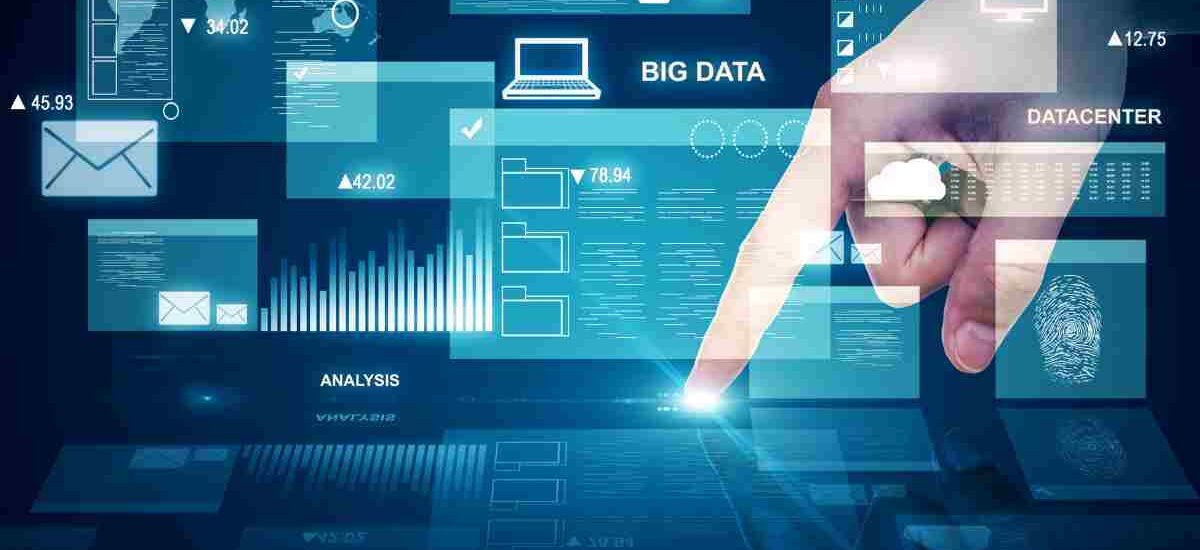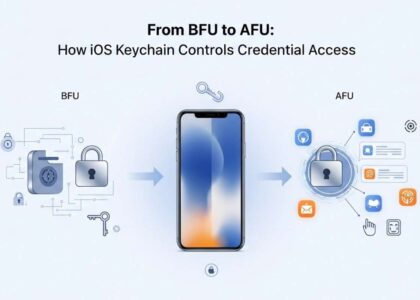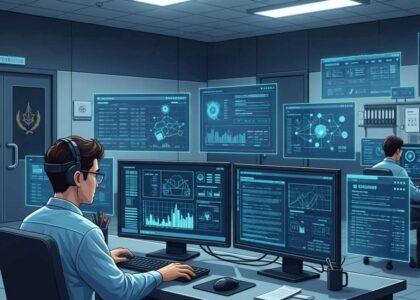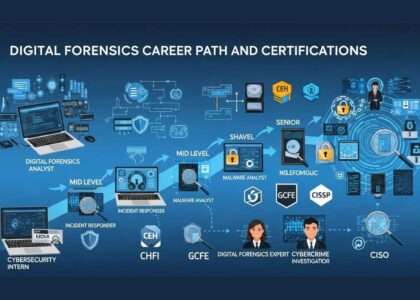Introduction: What Even Is Digital Forensics?
Imagine a detective—but instead of chasing bad guys down dark alleys, they’re digging into smartphones, hard drives, and the cloud to uncover hidden truths. That’s digital forensics in a nutshell. It’s a specialized branch of cybersecurity that deals with identifying, preserving, analyzing, and presenting digital evidence.
From tracking down cybercriminals to analyzing data breaches or solving corporate fraud cases, digital forensic experts are the silent warriors of the digital world. But the question still stands…
Is digital forensics actually a good career?
Let’s dig deep (pun intended) and explore everything you need to know—from job roles to future scope, salaries, pros, cons, and even the skills you’ll need to thrive.
1. The Growing Demand for Cyber Sleuths 🕵️♂️
Every single day, over 6.8 million data records are compromised. Phishing, ransomware, insider threats, espionage—you name it. As the cyber threat landscape grows, the need for digital forensic professionals skyrockets.
Why the Demand Is So High:
- Companies are constantly under threat from cyberattacks.
- Governments need experts to investigate terrorism, child abuse, or cyber warfare.
- Law enforcement uses digital evidence in court—phones, laptops, emails, metadata.
- Private investigators also need DFEs (Digital Forensic Experts) for divorce, theft, stalking cases.
In fact, (ISC)² Cybersecurity Workforce Study shows a global shortage of millions of cyber professionals. Forensics? A major piece of that puzzle.
2. So, What Do Digital Forensic Professionals Actually Do?
Here’s where the job gets cool.
You might be:
- Investigating a laptop used in financial fraud
- Analyzing mobile data from a murder case
- Tracing cryptocurrency in money laundering
- Recovering deleted files from an employee’s device
- Writing reports that go straight to a courtroom
Common Job Titles:
- Digital Forensics Analyst
- Computer Forensics Investigator
- Cybercrime Analyst
- Incident Response Specialist
- Malware Analyst
- eDiscovery Specialist
Sounds cool? It is. But it’s not just about hacking into phones like in movies. There’s a lot of documentation, legal compliance, and detailed reporting involved.
3. The Skills You Need (And How to Get Them) 🧠
No, you don’t need to be a 12-year-old genius coder.
But you do need a mix of technical, analytical, and soft skills.
🔧 Technical Skills:
- Operating Systems (Windows, Linux, macOS)
- File Systems (FAT32, NTFS, ext4)
- Networking and Protocols (TCP/IP, DNS)
- Cryptography basics
- Scripting (Python, Bash)
- Forensic Tools (FTK, EnCase, Autopsy, Wireshark)
🧠 Analytical Skills:
- Pattern recognition
- Attention to detail
- Thinking like an attacker
- Understanding logs, timestamps, metadata
🗣 Soft Skills:
- Report writing
- Courtroom communication
- Ethics and confidentiality
- Stress management
📚 How to Learn It:
- Take courses: Youtube, CEH, CHFI, Linux and Networking
- Get certified: CHFI (EC-Council), GCFA (GIAC), CCE (ISFCE)
- Do internships or labs
- Practice with free forensic images (from CTFs, online repositories)
4. Digital Forensics Career Paths and Job Opportunities
This field isn’t a one-way street. It’s a multi-lane highway with exciting exits.
🔍 Law Enforcement:
Work with police or federal agencies like the FBI, CBI, or Interpol. Handle criminal cases, child exploitation, terrorism, or trafficking.
🧑⚖️ Legal Firms:
Work with lawyers to gather admissible digital evidence. Often involves civil cases, fraud, or eDiscovery.
🧑💻 Corporate Sector:
Many companies—especially in finance, healthcare, tech, and retail—hire in-house forensic investigators to manage incidents and prevent insider threats.
🛡 Cybersecurity Firms:
Join companies offering incident response and forensics as a service. You’ll work on high-stakes investigations for clients.
👩🏫 Research & Teaching:
As digital crime evolves, so does the need for research. You can even become a forensic trainer, college lecturer, or write your own book!
5. Salary Insights 💰 (It’s Better Than You Think)
Let’s be honest. Passion is cool, but so is getting paid.
🌍 Global Salary Estimates:
- USA: $75,000 – $130,000/year
- UK: £30,000 – £85,000/year
- India: ₹4.5L – ₹20L/year
- Middle East: AED 120,000 – AED 300,000/year
- Remote roles: Top companies hire globally, often at competitive rates
Freelancers or consultants can charge $75–$250/hour depending on skill level.
6. Pros of Choosing a Digital Forensics Career ✅
✔ High Demand = Job Security
Cybercrime isn’t going away. If anything, it’s getting worse. This means long-term stability and low unemployment risk.
✔ Exciting & Varied Work
No two cases are ever the same. One day you’re analyzing logs from a compromised server, the next you’re diving into encrypted iPhones.
✔ Ethical Satisfaction
You’re part of the justice system. You’re helping victims. You’re uncovering truth.
✔ Excellent Growth Potential
You can move into management, become a cybersecurity consultant, or even start your own firm.
✔ Remote & Freelance Opportunities
Many forensic tasks can be done from anywhere with secure access—perfect for digital nomads or side hustlers.
7. Cons You Should Know ❌
Let’s be real. Not everything’s shiny.
❗ Stress & Long Hours
Some cases, especially criminal ones, can be emotionally draining and time-sensitive.
❗ Legal Complexities
Digital evidence must be collected, preserved, and presented under strict legal protocols. One misstep, and it’s inadmissible.
❗ Constant Learning
New devices, new apps, new threats—if you’re not updating your skills, you’re falling behind.
❗ Not Always Like CSI
It’s not just action and drama. A lot of the job is sitting, reading logs, writing long reports, and validating chain of custody.
8. Is Digital Forensics Suitable for Beginners?
YES. Many people start from scratch—some come from IT, law, or even criminal justice. If you’re willing to learn and start small, this career is absolutely beginner-friendly.
Start with:
- Learning about how data works (file systems, metadata)
- Playing with forensic images from CTF platforms
- Taking online courses or beginner certs
- Joining digital forensics communities (Discord, Reddit, LinkedIn)
9. Future of Digital Forensics: Is It Evolving? 📈
Absolutely.
Trends to Watch:
- Cloud Forensics: Investigating AWS, Azure, GCP environments
- Mobile Device Forensics: Decrypting encrypted phones and apps
- IoT Forensics: Smart TVs, fitness trackers, smart homes
- AI in Forensics: Predictive analytics, automated log parsing
- Blockchain & Crypto Forensics: Following Bitcoin trails
The rise in deepfakes, encrypted communication apps, and AI-generated content will only make digital forensics more critical in the coming years.
10. How to Get Your First Job in Digital Forensics (No Experience)?
Everyone starts somewhere. Here’s a roadmap:
- Get foundational knowledge (cybersecurity basics, operating systems)
- Take free/paid online courses to build skills
- Practice labs (Autopsy, FTK Imager, Volatility)
- Start a blog or portfolio to document case studies or CTFs
- Get a beginner cert (like CHFI or GCFA)
- Apply for internships or entry-level SOC roles
- Network on LinkedIn, go to cyber meetups, talk to real professionals
Even a basic SOC role or internship in IT security can be your stepping stone into forensics.
11. Final Verdict: Is It a Good Career?
Short Answer: Yes.
Long Answer: Heck yes.
If you enjoy problem-solving, have a curious mind, and want a meaningful, future-proof career where you fight digital crime and make a real-world impact—digital forensics is a goldmine.
It’s not always easy, but it’s incredibly rewarding, both mentally and financially.
Want to Get Started? Your Action Plan
- Watch beginner YouTube videos on digital forensics
- Download Autopsy and try analyzing a dummy image
- Read real forensic case studies (like from Sans DFIR)
- Follow experts on LinkedIn and Twitter
- Bookmark: DFIR.training for tools & labs
Closing Thoughts
Digital forensics is where tech meets truth. Whether you’re cracking open deleted messages or writing reports that convict cybercriminals, you’re a modern-day detective with a keyboard instead of a badge.
So, is digital forensics a good career?
Only if you’re ready to be the Sherlock Holmes of the 21st century.






